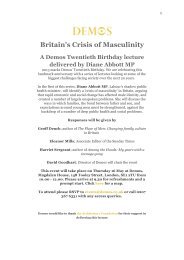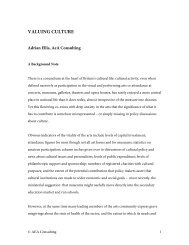Cultural diplomacy - Demos
Cultural diplomacy - Demos
Cultural diplomacy - Demos
You also want an ePaper? Increase the reach of your titles
YUMPU automatically turns print PDFs into web optimized ePapers that Google loves.
<strong>Cultural</strong> Diplomacy<br />
of ‘soft power’, 1 but security expert Walter Laqueur, sees it differently:<br />
‘<strong>Cultural</strong> <strong>diplomacy</strong>, in the widest sense, has increased in importance,<br />
whereas traditional <strong>diplomacy</strong> and military power . ..are oflimited<br />
use.’ 2<br />
The term ‘cultural <strong>diplomacy</strong>’ is not easily defined. When thinking<br />
about culture, we have taken as our starting point the United Nations’<br />
1948 Universal Declaration of Human Rights, in which Article 27(1)<br />
states that: ‘Everyone has the right freely to participate in the cultural<br />
life of the community, to enjoy the arts, and to share in scientific<br />
advancement and its benefits.’ In this report, we take a broad view of<br />
what the term culture includes, and discuss science, sport and<br />
popular culture as well as the performing and visual arts and heritage.<br />
In our research, we have been working primarily with partners<br />
among the ‘memory institutions’ (the British Library, British<br />
Museum, Natural History Museum and Victoria & Albert<br />
Museum), the scientific/cultural institutions (Royal Botanic<br />
Gardens, Kew, and Natural History Museum), in the performing arts<br />
with the Royal Opera House, and with the cultural agency the British<br />
Council (BC), which undertakes cultural relations activities on behalf<br />
of the Foreign and Commonwealth Office (FCO).<br />
In addition to extensive research in the UK, we have carried out<br />
fieldwork in China, Ethiopia, France, India, Norway and the United<br />
States of America and undertaken detailed desk research on Iran. The<br />
differences in national approaches are summarised in the appendix.<br />
Our aim has been to understand how different nations approach and<br />
carry out their cultural <strong>diplomacy</strong> in order to make recommendations<br />
about how the UK should develop its strategy, policy and<br />
practices in this area.<br />
One significant finding is that it is becoming more important for<br />
us to pay attention to cultural <strong>diplomacy</strong>. We are moving from a<br />
world where the term was primarily concerned with relations<br />
between elites – where static and traditional cultural settings<br />
provided the opportunity and backdrop for relaxed ambassadorial<br />
and political contact, for example – to one where culture is also a<br />
medium between people on a mass scale. Many-to-many cultural<br />
16 <strong>Demos</strong>






